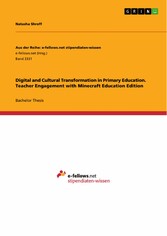Suchen und Finden
Service

Digital and Cultural Transformation in Primary Education. Teacher Engagement with Minecraft Education Edition
Natasha Shroff
Verlag GRIN Verlag , 2020
ISBN 9783346092199 , 71 Seiten
Format PDF
Kopierschutz frei
Geräte
Mehr zum Inhalt

Digital and Cultural Transformation in Primary Education. Teacher Engagement with Minecraft Education Edition
Bachelor Thesis from the year 2018 in the subject Didactics - Business economics, Economic Pedagogy, grade: 8,6/10, , language: English, abstract: With the fast-paced change of society, a transformation of education is vital in preparing today's students for tomorrow's challenges such as a technology-based labor market. A concept named 21st century learning has been developed by various stakeholders, to frame the new type of skills required to succeed in the changing business environment. In this study, an investigation into primary school teacher engagement with emerging educational technology has been carried out in the case of Minecraft: Education Edition, a game-based emerging educational technology. The game was selected because it facilitates the learning of 21st century skills and hence provided a suitable choice to test various teacher technology engagement factors on a global scale. 21st century skills were found to focus on students' knowledge adaption and application rather than the traditional teaching, based on knowledge acquisition and assimilation. Concepts are based on a variety of skills such as basic ICT skills, media literacy to support critical thinking in terms of data and conscious decision-making, informational & computational thinking, as well as the social and emotional learning aspect. The latter being a critical component for graduates to thrive and collaborate in a continuously adapting environment. This digital and cultural transformation requires students to take more responsibility, ownership, and agency over their learning. Hence, time and place independent, student-centered, and flexible learning, are encouraged through 21st century education. With the transformation of education, new skill requirements for teachers were found to be essential for a 21st century skill transfer in primary schools. Such requirements include high levels of teacher agency, basic digital skills and pedagogical-technological integration competences to take responsibility for the EdTech integration. To apply technology effectively, teachers are recommended to build their ICT self-efficacy, their own beliefs in their digital skills, on a continuous professional learning journey. To increase the latter engagement component, measures such as sharing expertise and experiences in a (global) teacher community as well as pro-actively seeking increased collaboration with teachers and students are recommended.
Shop

